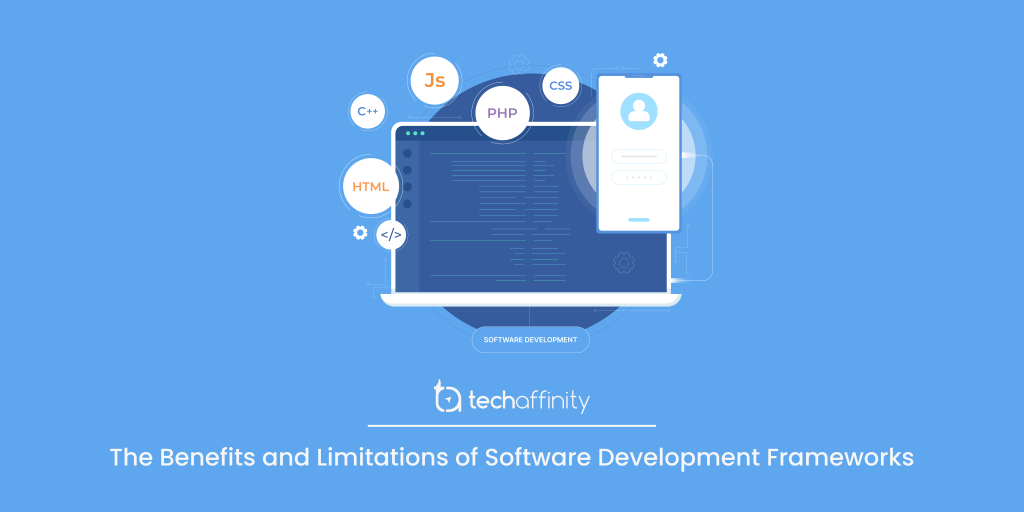The Benefits and Limitations of Software Development Frameworks

Author : TechAffinity 23rd Mar 2023

In the modern world, businesses need to stay connected with their customers and expand their digital outreach over the web and mobile. To do this effectively, you can leverage software development frameworks. As a developer, you must choose the necessary frameworks to accelerate development and enhance the output.
The reasons for choosing a framework may vary based on the use case. It is best to stay away from frameworks when you need to develop services that need to stand out from the rest. You can consider this when you have highly skilled and experienced developers.
In this blog, we will be looking at the definition of a framework, the different kinds of frameworks, the advantages and disadvantages of frameworks, and when to use and not use software development frameworks.
What is a Framework?
A framework provides a base for building the software project, i.e., it includes the architecture, abstraction, and basic code required. It saves time and strengthens the project throughout the software development lifecycle. Using this foundation, you can develop the code further while maintaining good coding practices while sticking to the rules prescribed by the framework. For highly critical sites, you must consider the advantages and disadvantages of the web application frameworks before deciding on the framework.
Different Types of Frameworks
You can find a variety of software development frameworks based on their functionality and programming language.
1. Frontend Frameworks
Frontend or client-side frameworks offer basic templates of HTML, CSS, and JavaScript to create the front end of a web application or website. The most popular frameworks include Bootstrap, React, and AngularJS. Bootstrap is best for creating highly responsive web content. Due to its rich UI library, React can create visually appealing apps with component-based architecture. AngularJS creates reusable components for building dynamic web pages and single-page applications.
2. Backend Frameworks
Backend or server-side frameworks provide basic functionality to guide software development. The most popular frameworks include Django and Rails. Django is best known for supporting complex and data-driven apps. Rails handles cloud-based web applications.
3. Mobile Frameworks
A mobile development framework is a software platform to create code for different mobile devices. The most popular frameworks include React Native and Flutter. React Native creates native applications for both Android and iOS while supporting platform-specific versions and third-party plugins. Flutter lets you create native Android and iOS applications making them visually engaging to the end users.
The Advantages of Software Development Frameworks

1. Standard Coding Practices
By choosing the proper framework, you can effectively create a neat and well-defined structure to be implemented during the development cycle. You need to ensure smooth communication within and across teams in your organization. Using the framework, you can simplify the project structure and standardize the onboarding process.
2. Simplified Development Process
Using the framework, you can develop and maintain a well-thought-out web application with high performance and stability. It is essential for developing high-traffic and complex applications. It ensures a common design language that everyone can easily understand and communicate with each other.
For smaller applications, frameworks significantly reduce the number of lines and speed up the development process. For enterprise applications, you can deploy a high-quality framework with many pre-built tools and packages. It reduces development time by cutting down on writing thousands of lines of code.
3. Speed & Productivity
Frameworks accelerate the development process from the initial stage to a working prototype in a relatively short period. You can use the templates to write repetitive boilerplate codes. By reducing the time spent on these repetitive tasks, you can focus more on solving creative problems bringing more value to the end customer and increasing productivity.
4. Testing & Maintenance
You can see the real advantage of using a software development framework during the testing phase. You can use the right tools and resources to support the test phase and reduce the time taken to perform the most arduous tasks. You can test the applications built with a rigid framework more easily than applications using a custom solution.
5. Community
The community of developers, testers, and users is the most overlooked and underappreciated aspect of software development frameworks. They create a solid knowledge base of documents, articles, and discussions to address the common issues of the framework and highlight the productive development paths. Some popular frameworks with strong communities are ReactJS, AngularJS, and Django.
The Disadvantages of Software Development Frameworks
1. Understanding the Framework
You can customize any framework without trying to alter its basic structure, functionality, and design characteristics. You must adhere to the design limitations and restrictions imposed by the framework. While sticking to the conventions and regulations of a framework might be an advantage, you must be sure that the chosen framework meets the needs and requirements. You must avoid forcefully using frameworks as they will later cause several problems instead of providing solutions.
2. Over-Reliance on the Framework
If you heavily rely on frameworks, you might lose the opportunity to learn the underlying language associated with the framework. Since the framework does most of the work for you, you often tend to skip over the details of the system. For example, you might be able to address the challenges related to jQuery and not JavaScript. With a framework, you interact only with the higher levels of the system and have fewer chances to solve complex problems.
3. Too Many Features
Any framework has many pre-built tools and packages to cater to varying user requirements. So, it includes a list of functions, features, and code that will be useless and irrelevant to your project. When you develop simple web applications, the extra files and unnecessary code hurt the overall speed and performance. You can use a lightweight framework like Express for Java or Flask for Python development.
When to Use and Not Use Frameworks?
We recommend that you use frameworks in the following cases.
- When there are a lot of new developers on your team.
- When you know that the chosen framework is suited for the project.
- When the framework does not have many irrelevant features.
- When the framework will make it easy to develop and maintain the code.
You must avoid the use of frameworks in the following cases.
- When you need lightweight solutions without extra features.
- When you have a team of highly skilled and experienced developers.
- When you are working on a customized solution for a long-term project.
- When you need to learn the language in depth to gain expertise.
Conclusion
By understanding the pros and cons of software development frameworks, you can know when, where, and how to deploy them based on the project and use case. It takes several years of experience for you to choose the proper framework. TechAffinity has several highly skilled developers who can carefully analyze the costs and benefits of various software development frameworks and recommend the best solutions. Please send your queries to media@techaffinity.com or get in touch by scheduling a meeting with our developers.